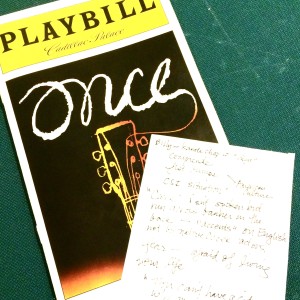 I wanted to really like Pitch Perfect 2, and I didn’t want to start analyzing the casting of the musical “Once.” But I have eyeballs and vision/astigmatism correcting contact lenses, and my hearing is pretty awesome when it comes to racist and sexist subtext.
I wanted to really like Pitch Perfect 2, and I didn’t want to start analyzing the casting of the musical “Once.” But I have eyeballs and vision/astigmatism correcting contact lenses, and my hearing is pretty awesome when it comes to racist and sexist subtext.
I have a vested interest in the arts – music, movies, visual art, dance, literature, etc. My daughter is a dancer. My husband not so secretly hopes to write a screenplay. My sons aspire to be professional gamers, which in my book requires some ability to design visually pleasing platforms that do not objectify women or bring more unnecessary violence into the world.
So I can’t seem to not pay attention to the names, credits and faces on stage or screen. Call me sensitive. Or, I dare you to accuse me of playing the race card. I’m wearing yoga pants. I have no pockets for a race card.
But I have eyeballs and vision/astigmatism correcting contact lenses. Why did they ruin Pitch Perfect 2 with those horrible racist jokes that I think were supposed to help put the “international” context of the movie into the humor but failed. Why did it fail? Because this is not a post-racial America. Yes, I know Germans were stereotyped with accents, black clothing, and blonde hair. I don’t have the energy to explain fully why those still support a white dominant culture that affirms all things “white” (aka white supremacy, but that may feel too harsh or scary), but those clothes, except for the man-skirts, were “cool” while the blonde hair and accents do not separate them from being white or accepted in America.
However, Latino or Asian accents, fake or real, mean you’re stupid. They mean you need to learn proper English. They mean you don’t belong here, that you must be the landscapers or the nail techs, are you are the nanny or do you love me long time, where are you from, no where are you really from, I mean where were you born, or maybe your parents or grandparents, that’s amazing because you almost speak perfect English, you are not what I thought you were, saw you as.
We code switch. We assimilate. We change our names, our faces, our accents. We melt.
When I am visible in those ways I want to be invisible. It’s not a super power as in a hero. It’s wanting to disappear for self-preservation.
But then last week my husband and I saw the musical “Once,” and I scribbled notes in my Playbill in the dark as I watched an all-white cast…again.
- Why were people of color invisible?
- Are there no people of color in Ireland?
- Or were there no qualified actors of color who could fake an accent and/or play the piano, guitar, Cajón, mandolin, and/or sing?
- No one on stage actually spoke Gaelic or Czech. The entire play is in English with native English speakers, some with what sounded like faux accents. (Well, I don’t actually know but the accents faded in and out very unlike my grandmother’s and my parents’ accents.)
- Why is Billy saying “hi-ya!” and karate chopping, saying “comprende” and fist bumping while referring to CSI?
- Why is “American” culture being integrated into the show if the all-white cast is supposed to be Irish and Czech and Ireland?
Why were people of color invisible?
“My frame was not hidden from you when I was made in the secret place. When I was woven together in the depths of the earth, your eyes saw my unformed body.” Psalm 139:15, 16a
I don’t want to be invisible. I don’t want who I am to disappear into a stereotype or into generalities. I want to be seen as fully human, embodied.
Thank God I am seen.
What is so strange is that Kay Cannon, the screenwriter for PP2, is the sister-in-law of my friend who is Korean-American. Kay’s nieces and nephew are all half-Korean. So you can even have Asian-Americans in your family, and still miss the fact that insensitivity is insensitivity.
We all have our blind spots and a journey. The danger is when the ability to influence broadly is coupled with blind spots like this. My bad. I had friends warning me that it was cringe-worthy.